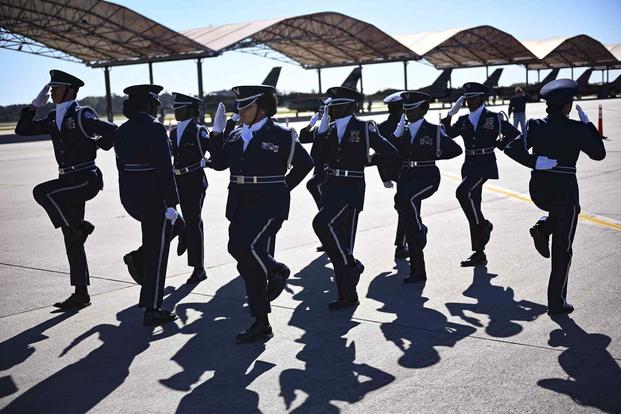
Twenty-one instructors in the Junior Reserve Officers' Training Corps program were accused of sexual misconduct against high school cadets in the 2022-23 school year, but the Pentagon enacted several congressionally mandated reforms this year to curb the issue, the department said in a recent letter to Congress.
The number of allegations of sexual misconduct was disclosed in a new annual report to Congress that is now required after language was included in last year's defense policy bill amid concerns about a high rate of sexual assault and harassment in the high school program. The report was first sent to the House and Senate Armed Services committees in May, but was also included in a letter obtained by Military.com that was sent to Sen. Elizabeth Warren, D-Mass., last month outlining the steps the department has taken to comply with the defense bill's required JROTC reforms.
"It's unthinkable that students who have joined JROTC to develop leadership skills and learn about military service have been abused by their instructors -- adults they're supposed to be able to trust," Warren, who chairs the Senate Armed Services Committee's personnel subcommittee, said in a statement to Military.com. "I fought hard to get these provisions into the [defense bill], because it's critical that we protect JROTC students from harm. I'm glad to see the Department of Defense taking important steps to implement these reforms, and I'll keep working to make sure they're put into action as effectively as possible."
Read Next: GOP Lawsuits Threaten to Disenfranchise Military Voters, Advocates Warn[1]
A Pentagon spokesperson did not respond to Military.com's request for comment for this story. But in its report to Congress, the department said that "any incidence of sexual discrimination, harassment or misconduct by JROTC instructors is unacceptable."
"The department has implemented enhanced policies to facilitate increased oversight of JROTC programs and foster communication with the schools and school districts that host the programs," the report said.
Congress added language to the annual defense bill, called the National Defense Authorization Act, or NDAA, to build more safeguards in the JROTC program after news reports and congressional investigations uncovered widespread sexual misconduct in the program meant to instill leadership skills and citizenship values in teenagers.
The JROTC program is a partnership between the Defense Department, the military branches and high schools around the country, with more than 3,500 units nationally and nearly 500,000 students participating. Instructors are often retired or reserve military officers employed by the school district, but can be active-duty service members.
Unlike the college-level ROTC[2] program, there is no requirement to serve in the military after JROTC, but defense officials see it as a key pipeline[3] to military service at a time when the armed forces[4] are struggling to recruit young people.
Allegations of sexual assault in the JROTC program first came to light in a 2022 New York Times investigation[5] that found at least 33 JROTC instructors had been criminally charged with sexual crimes in the preceding five years.
That report spurred congressional inquiries, including a House Oversight Committee investigation[6] that uncovered 60 allegations of sexual misconduct over five years and a query from Warren that revealed 114 allegations[7] over a decade.
In the latest numbers given to Congress, 13 of the 21 allegations of sexual misconduct, harassment or discrimination from June 2022 through July 2023 were substantiated, four were not substantiated and four were still being investigated at the time of the report.
Just six of the allegations were investigated criminally, while the other 15 were investigated administratively, according to the report.
As a result of the investigations, 17 instructors were decertified permanently and removed, the report added.
"Beyond decertifying them as JROTC instructors, the military services and Department of Defense (DoD) have no further authority over the eligibility of a person to work as a JROTC instructor," the report to Congress said. "When allegations of misconduct are made against JROTC instructors they are investigated and adjudicated in the same manner as any allegations against other faculty or staff members of that school district and jurisdiction."
In an effort to provide more oversight of the JROTC program and prevent sexual misconduct, last year's NDAA required the Pentagon and military services to sign standardized agreements with every school with a JROTC program that set rules, including how quickly schools must notify the military about misconduct allegations.
The Pentagon finished writing the standardized agreement in February, the department said in its letter to Warren[8]. The agreement requires that schools notify the military branches within one business day if an instructor is being investigated or disciplined for misconduct, among other stringent requirements, according to a copy attached to the letter.
Each military service is also working on its own addendum to the standardized agreement to address any service-specific policies, the letter to Warren said.
The department also crafted a form for parents and students to sign that provides points of contact to report instructor misconduct, as well as an instructor code of conduct that has to be signed annually, the letter said. The instructor form specifies several prohibited activities, including developing "a personal, intimate, or sexual relationship with a cadet or student," attempting to "gain sexual favors from a cadet or student" and making "sexual advances toward" students and cadets, according to a copy attached to the letter.
In the report to Congress on the 2022-23 statistics, the Pentagon also pledged to "evaluate the effectiveness of these enhanced policies and make necessary adjustments to reduce and address allegations of sexual discrimination, harassment and misconduct."
Related: Reform JROTC Before New School Year Begins to Prevent Sexual Assault, Senators Tell DoD[9]
© Copyright 2024 Military.com. All rights reserved. This article may not be republished, rebroadcast, rewritten or otherwise distributed without written permission. To reprint or license this article or any content from Military.com, please submit your request here[10].